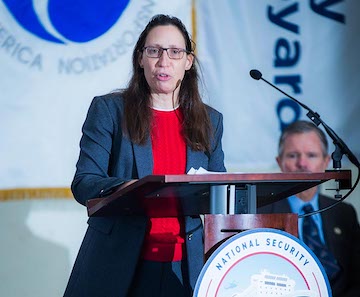Lucinda Lessley, Acting Administrator for the U.S. Maritime Administration (MARAD) said that MARAD would be responsible for awarding $2 billion in funding created by the President’s Bi-Partisan Infrastructure law through the Port Infrastructure Development Program (PIDP): “The PIDP grants are awarded on a competitive basis to port projects that will improve the movement of goods to, through and around ports.”
Lessley was the keynote speaker at the CapitalLink Jones Act & US Flag Shipping Forum on February 24th.

She noted a major success of the Marine Highway program: “Our oldest Marine Highway project the James River Expansion project moves tens of thousands of trucks from the I-64 corridor between Richmond and Hampton Roads… The service has also attracted 1,000 warehouse jobs to the region.”
Lessley said: “the U.S. is facing a shortage of mariners with unlimited tonnage credentials as such we are working on the fiscal year 2022 through fiscal year 2026 mariner workforce development plan …and support mariner workforce diversity and workplace safety. We anticipate this will help nurture …. a strong U.S. merchant marine …To attract the next generation of mariners we have to ensure that our merchant marine reflects the diversity and values of the nation it serves.”
In addressing the issue of mariner safety, Lessley said MARAD briefly suspended the U.S. Merchant Marine Academy ‘Sea Year’ program in which students work alongside predominantly male crew members on ships. The suspension occurred after a 19-year-old midshipman reported being raped at sea.
Lessley explained:” We paused our ‘Sea Year’ training for a short period while we worked to improve safety and support the culture of respect … We publicly announced a multipart plan to provide safety for all cadets and indeed for all mariners on commercial vessels.”
In other news, Jones Act carriers reported that they are weathering the challenges of higher prices, COVID and supply chain disruptions in the delivery of cargoes to Hawaii and Puerto Rico.
Company executives provided these updates:
Chris Hamlin, Senior Vice President & General Manager Pasha Hawaii, The Pasha Group reported that regular service to Hawaii has been maintained although the company has had to contend with supply chain disruptions on the West Coast and challenges from the COVID virus: “If you look at the on-time arrivals of our vessels over the last two years, they are in line with the last five years. So, we have not seen a major disruption in vessel delays or cargo delays.” He said the Jones Act services are more insulated from disruptions experienced in international trade services because carriers such as Pasha have “dedicated chassis in the fleet, dedicated truckers in the fleet and in some cases dedicated terminals and berths.”
Joel M. Wine, Senior Vice President and Chief Financial Officer, Matson, Inc. echoed Hamlin that Jones Act services to Hawaii and Alaska “have been operating extremely normally. There have been some ups and downs with labor availability that that have impacted terminal operations.” Wine said that one of the challenges Matson faces going forward is reducing its carbon emissions on its ships and noted that three new ships the company plans on ordering will be LNG powered.
Eduardo Pagan, Vice President & GM Caribbean Services, TOTE Maritime Puerto Rico said that TOTE’s decision to invest in LNG powered vessels early on has now paid off. He said the company was able to avoid major disruptions in its Puerto Rico operations because employees had faced hurricanes and other emergencies in the past and so were prepared to operate from their homes during the COVID virus and maintain services to customers. “We in Puerto Rico have experienced significant growth…and our services levels were not affected at all. Our personnel had to go into remote work and this was really smooth and fantastic…You have to remember that our island has gone through several issues in the past in relationship to hurricanes earthquakes and others. So we really do have very strong resiliency plans. Since the pandemic Tote Puerto Rico has been operating with about two third of its employees working from their houses”
Mitch Luciano, President & CEO, Trailer Bridge, Inc. said that a major challenge for the company was “keeping our people healthy” and observing all protocols to minimize employees to COVID exposures. As far as service is concerned, Luciano said: “We also serve Puerto Rico and the Virgin Islands and one thing we have been able to provide is the consistency. In the Jones Act you know that ship is going to be there on Monday and it’s going to be there on Wednesday.”

